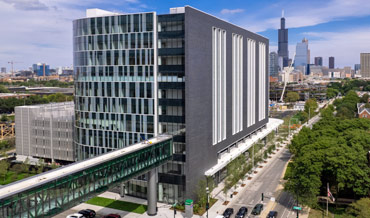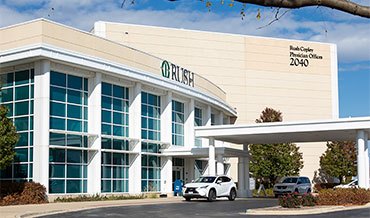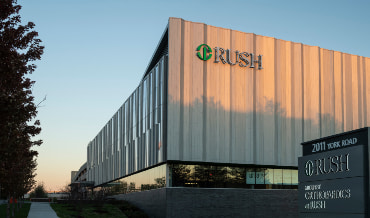General neurologists help you address issues that affect your brain, spinal cord or nerves. They can provide care for many different conditions or, when needed, refer you to another specialist for more directed, specific care.
Some of the most common problems that general neurologists can help with include the following:
- Headaches and migraines
- New onset of weakness
- Sensory loss
- Difficulty walking
- Difficulty speaking
- Memory issues
- Tremors
The Rush Approach to General Neurology
Rush general neurologists work with you to find the cause of your symptoms and meet your individual needs and goals. They focus on understanding you as a person and how your symptoms affect your life.
You can expect your first appointment with a general neurologist to take about an hour. In many ways, they will act as a detective. The neurologist will gather clues by asking you questions and giving you tests to find out what’s going on. From there, they can develop a care plan or refer you to a specialist for further treatment.

Diagnosing General Neurology Conditions
To diagnose your condition, a general neurologist will need to gather information from you, perform a neurologic exam and, if needed, run some imaging or other diagnostic tests to confirm the diagnosis.
Information gathering: It's important for you to be able to give your general neurologist as complete a history of your symptoms as possible. If you can, you should tell your neurologist the following:
- What symptoms you have
- How severe your symptoms are
- When they first appeared
- Whether they’ve gotten worse over time
- Whether they come and go
- Any prior diagnosis, imaging or treatment you’ve had
- Any other medical conditions you have
- A complete list of any medications you take
- Your family history with neurological problems
You may wish to ask a partner or someone close to you for help remembering the details.
Neurologic assessment: Once your general neurologist has gathered some information from you, they’ll perform a detailed neurologic exam. This helps them find out how well your central nervous system, peripheral nervous system, muscles and nerves are all working.
They’ll do a neurologic assessment that includes some basic tests of your cognition, speech and ability to move and sense objects.
Further testing and imaging: Most of the time, the neurologist will be able to diagnose your condition or rule out many conditions with your neurologic exam and your history of symptoms. They can confirm the diagnosis with imaging tests, such as CT scans and MRIs of your brain or spine.
If they're concerned about your potential for seizures, other tests might include an electroencephalogram, or EEG, which is a brain wave study. If they suspect neuropathy or myopathy, they may do a nerve conduction study, which measures how fast signals move through your nerves, or electromyography, or EMG, which records electrical activity in your muscles.
Rarely, the neurologist may need to do tests that are more invasive, like a lumbar puncture to check cerebral spinal fluid and make sure there's not an infection or other inflammatory condition.
Once they’ve diagnosed your condition, the general neurologist can offer you a custom care plan and connect you to other Rush specialists as needed.
Second Opinions From General Neurology at Rush
If you have a diagnosis or a recommended treatment for your neurological condition, a second opinion can be very helpful. It can confirm your diagnosis and reassure you in your decisions about your care. Or it can help you better understand your condition and provide you with new options.
To get a second opinion on your neurological diagnosis, call Rush at (888) 352-7874.
Choosing Rush for General Neurology
- Neurological detectives: The first goal of our general neurologists is to find the cause of your symptoms. After that, they want to give you the best level of care possible. When they believe you need more care, they connect you to other Rush neurological specialists who will provide further treatment.
- Expert care for your condition: Your general neurologist can give you access to specialists and neurosurgeons who are experts in movement disorders, epilepsy, stroke, multiple sclerosis, neuromuscular diseases and more.
- Experience with a wide variety of brain and nerve issues: Our general neurologists see thousands of patients per year. This experience allows them to draw on treatments that have effectively addressed symptoms like yours.
- Long-term management of chronic conditions: For chronic conditions, our general neurologists can be your guide for what to expect and discuss treatment options. Their goal is to help you live your best life.
- The latest headache, migraine, tremor and MS treatment: Our general neurologists can offer injections, such as botulinum toxin or Botox, as well as infusion therapy for headache and migraine relief. We are one of the only facilities in the Midwest to offer focused ultrasound to reduce tremors, which can be an alternative to invasive brain surgery. And we have a brain health program that combines lifestyle changes and other therapies to treat conditions like MS.
- Multiple locations for your convenience: Rush has general neurologists throughout the Chicago area, including the South Loop, downtown Chicago, Oak Park, Oak Brook and Aurora.
- Nationally recognized care: U.S. News & World Report includes Rush University Medical Center on its Best Hospitals Honor Roll and ranks its neurology and neurosurgery program among the best in the country. Rush has also been included on multiple honor rolls for stroke care by the American Heart Association and named a Center of Excellence by the Parkinson's Foundation.
FAQs About General Neurology
A general neurologist is like a primary care physician for your brain, spine and nerves. They can provide testing for neurological problems, diagnose any issues, create care plans for many conditions and refer you to a specialist for further care.
If you’ve developed symptoms like tremors, memory loss, sensory loss, difficulty moving or speaking, weakness, headaches or related neurological symptoms, a general neurologist can help. They often see patients who are concerned about Alzheimer’s disease and dementia, epilepsy, migraines, Parkinson’s disease, seizures or dizziness, among other issues.
Neurological treatments vary depending on your condition. Many, like Parkinson’s disease, can be treated with medications. Patients who’ve had strokes may need medication to prevent a secondary stroke. Those with epilepsy may need anti-seizure medication. For headaches and migraines, some patients may need a daily prophylactic medication to prevent symptoms, or they may need abortive medication to stop symptoms as they appear.
Some conditions need more care than the medication a general neurologist prescribes. The general neurologist will always look for the least invasive treatment available, but some patients need surgery. For these patients, the general neurologist can refer them to a neurosurgeon who can help.
Yes, some neurological conditions can be related to genetics. Usually these appear during childhood and are treated through pediatric neurology. But some genetic problems aren’t found until adulthood.
These conditions can be difficult to prevent, but there are many new enzyme and gene therapies and more that are being investigated. With genetic issues, the sooner treatment begins, the more effective it tends to be. If you have a history of neurological disease in your family, you may want to talk to your primary care physician about a checkup with a general neurologist. They can discuss any preventive care you might need.
Some people might need a checkup with a general neurologist, but everyone should have at least an annual checkup with their primary care physician. They can conduct some neurological tests and, depending on the results, recommend a general neurology checkup to a patient.
In some cases where there is high risk of neurological issues or a family history of neurological disease, a patient may need more regular screening. For example, a patient with a ruptured cerebral aneurysm or with two or more first-degree relatives who’ve had an aneurysm should have neurological checkups more frequently. A neurologist can make a recommendation about the schedule of screening.
Yes, some neurological issues may only need observation or minimal treatment. This depends on how severe the condition is and how much it affects your life.
For example, essential tremor can be fairly benign unless it is making it difficult for you to do your daily activities, like raising a cup to your mouth to drink. This may not require much treatment. But some conditions are progressive, meaning they may get worse over time. Depending on your diagnosis, treatment may start with observation then require further care later.
Yes, there are neurological emergencies that require immediate care. Stroke is one of these conditions. If you have a sudden onset of weakness, numbness, tingling, speech problems or loss of vision, you could be having a stroke.
Seizures that do not stop, spinal cord injuries and traumatic brain injuries are other emergency situations.
Neurologists recommend that you call 911 and get to an emergency room as soon as possible in these cases, as they can quickly become life-threatening.













